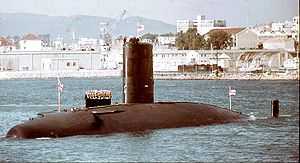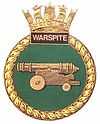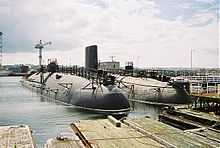HMS Warspite (S103)
 HMS Warspite | |
| Career | |
|---|---|
| Name: | HMS Warspite |
| Ordered: | 12 December 1962 |
| Builder: | Vickers-Armstrongs |
| Laid down: | 10 December 1963 |
| Launched: | 25 September 1965 |
| Commissioned: | 18 April 1967 |
| Decommissioned: | 1991 |
| Fate: | In storage, awaiting disposal |
| Badge: |
 |
| General characteristics | |
| Class and type: | Valiant-class submarine |
| Displacement: | 4,200 long tons (4,300 t) surfaced 4,900 long tons (5,000 t) submerged |
| Length: | 285 ft (87 m) |
| Beam: | 33 ft 3 in (10.13 m) |
| Draught: | 27 ft (8.2 m) |
| Propulsion: | 1 × Rolls-Royce pressurised water reactor 2 × English Electric steam turbines, 15,000 hp (11 MW) 1 × Paxman diesel-electric generator 1 shaft |
| Speed: | 20 knots (23 mph; 37 km/h) surfaced 28 knots (32 mph; 52 km/h) submerged |
| Range: | Unlimited, except by food supplies |
| Complement: | 116 |
| Armament: | 6 × 21 in (533 mm) bow torpedo tubes 24 torpedoes Later equipped with: • RNSH UGM-84 Harpoon (RN version of underwater launched cruise missile) • Tigerfish torpedoes • Main Sonar system 2001 |
The latest HMS Warspite was the third of Britain's nuclear-powered submarines, and the second (and final) of the Valiant class.
The second Valiant-class submarine, to be called Warspite was ordered from Vickers-Armstrong's Barrow shipyard on 12 December 1962, and was laid down on 10 December 1963.[1] She was launched on 25 September 1965[1] by Mary Wilson, the wife of the then British Prime Minister Harold Wilson, and entered service on 18 April 1967.[1]
Warspite underwent a two-year refit, which was nearing completion just as the Falklands War started. After the war ended she carried out a record breaking patrol around the island and the Argentine coast.[2]
She was also part of a BBC television documentory called Submarine.
The submarine was decommissioned due to mechanical failure associated with the reactor in 1991. Mainly operated out of HMNB Clyde, at Faslane (the former Clyde Submarine Base) with the Third Submarine Squadron. Her hull and reactor are currently laid up afloat at Devonport Dockyard, Plymouth until facilities are available for the long term storage of her radioactive components.
Notable commanders of this vessel include Sandy Woodward.[2] Woodward went on to command the Falklands Conflict battle group, became Commander-in-Chief Naval Home Command and rose to the rank of admiral.
Service
Collision with a Russian submarine
In October 1968 whilst following a Russian boat identified as an Echo II Warspite collided with the stern and propellers of that boat. Warspite suffered damage to her fin but after surfacing to inspect damage was able to submerge and return home, and later sail to Barrow for proper repairs.[3]
References
- Blackman, Raymond V.B. Jane's Fighting Ships 1971–72. London: Sampson Low, Marston & Co., Ltd. ISBN 0-354-00096-9.
- Gardiner, Robert; Chumbley, Stephen, eds. (1995). Conway's All The World's Fighting Ships 1947–1995. Annapolis, Maryland, USA: Naval Institute Press. ISBN 1-55750-132-7.
